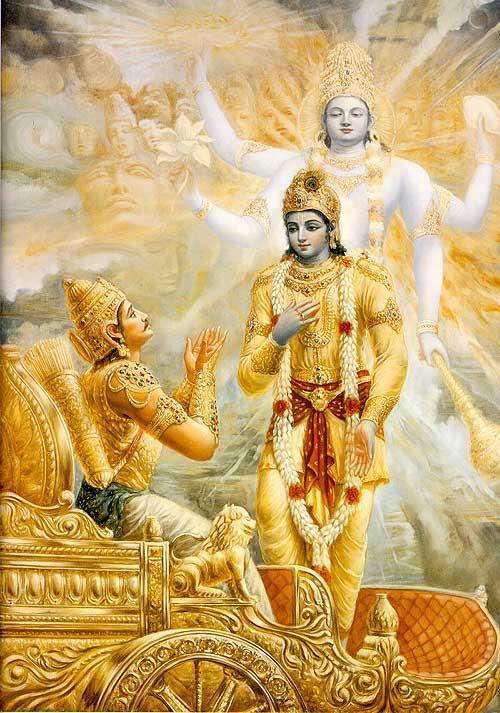Conquering the two-sided passion, Desire and Anger: 1
अर्जुन उवाच :-
अथ केन प्रयुक्तोSयं पापं चरति पूरुषः । अनिच्छ्न्नपि वार्ष्णेय बलादिव नियोजितः ॥3:36॥
Arjuna said:
O Varshneya (Krishna), by what is man impelled, even against his will, to perform evil- compelled, it seems, by force?

Every man sometimes experiences a peculiar state: even as he strives toward virtuous action, he seems to be dragged into temptation, almost by force.
The businessman trying to carry on honest business, and finding dishonest tradesmen more prosperous than himself, is often so strongly tempted to follow their example that he says he is “forced” to do so.
Many a moralist trying to control the strongest mental and physical impulse created by nature- the sex impulse-finds his mind driven, seemingly automatically, to sex thoughts and sex desire, and consequent illicit sex acts.
Attraction to pleasant tastes and odors, or even to beauty, art, and music, may harmfully lure the strict ascetic who wants to rise above them and concentrate on self-control.
During meditation and practice of Kriya Yoga, the devotee finds his mind concentrated in the spiritual eye and in the joy of the Self, beyond the entanglements of sensations and thoughts, with no other longing than to remain locked within that peace. Suddenly, without warning, he discovers he has been dragged down as it were, by some mysterious force-thrown into a mire of restlessness and the dark consciousness of corporeal sensations. Instead of remaining in the motionless preparation of the blessed soul, he seems impelled to forsake that state and indulge in sensory-motor activities that aggravate bodily consciousness.
The businessman, the moralist, the ascetic, and the devotee therefore ask the common question, introspectively: “Why is it that I am compelled, as though by force, and against my resisting wish, to commit error in thought and deed?”
Repeated performance of good or bad actions forms good or bad habits. Habits are psychological automatic machines that enable man to perform actions without conscious effort. To be able to perform good actions under the compelling influence of habit is beneficial, because good habits make easy the performance of good actions. The psychological machine of a good habit can create good activities by mass production. Without the automatic power of a worthy habit, a fresh difficult effort has to be made each time one strives to perform good action.
It follows, then, that the devotee should never form any evil habit, lest it enslave his will. To use the mechanical power of a habit in doing undesirable acts is misusing the God-given law of mind: “Ease comes with repetition.” This law should be used only to ease the performance of good works. Bad habits are destructive to health, morality, and inner peace. Overeating, for instance, or overindulgence of any sense under the spell of the habit of greed, causes physical disease or mental satiety or inner unhappiness.
According to its training, a parrot will repeat a holy name or a vile epithet, anytime, anywhere. So the bird should be taught to utter only good words, otherwise there will be embarrassing moments before select company! A bad habit, like an evilly taught parrot, repeats evil against one’s will any moment, anywhere- and brings humiliation and misery.
Regarding Arjuna’s query to Krishna, it can be said that people misuse the coercive power of habit to perform evil, while they should use that force only to perform good. Ignorance, lack of watchfulness, want of discretion in selecting right actions, and carelessness in choosing proper friends often entrap a person in a quicksand of bad habits that draws him down against his will. The influence of constant association is usually stronger than that of judgment or will power. Good or bad company is more potent than one’s inner resistance. The devotee who has noticed this fact might be moved to ask: “Why is it, Lord, that saints so easily act nobly, while wicked persons seem to be forced to act malevolently? “
A person is free to choose between good and bad actions before his inclinations solidify into habits. Once he becomes used to good or evil, he is no longer free.
“The diminutive chains of habit are seldom heavy enough to be felt until they are too strong to be broken.” – Samuel Johnson.
Some people form habits more easily than others. A person who is despondently ill or weak-willed or mentally deficient will fall readily into bad habits. In the subconscious mind of a moron, for instance, one act of smoking may form seed of a habit. Even a devotee who is not easily influenced must guard against the unconscious creation of bad habits. If he has already been poisoned by a bad habit he should cure himself by continuously using the antidote of good actions, good habits, and good company. Strange it is! Often a person-even while loathing his actions-finds himself indulging in anger, lust, prevarication, dishonesty, overeating, sloth, disorderly life, and so on, owing to his careless creation bad habits.
Bad habits of past lives appear as strong moods and octopus-like inclinations whose tentacles are strengthened by evil company and thoughtless actions. Wrong tendencies should be curtailed by man’s seeking good company and practicing self-control; and he should wholly consume those evils with the fire of discrimination and meditation.
Sri Paramahansa Yogananda Ji.
